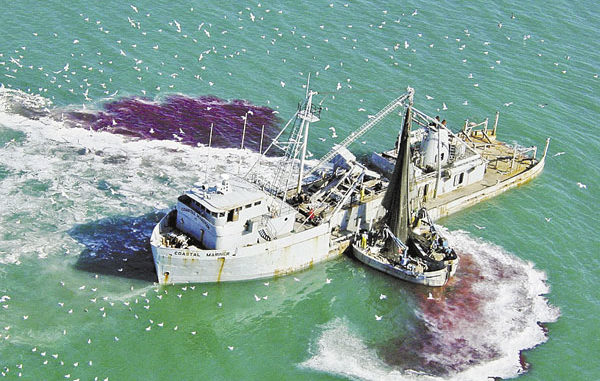
Bunker, fatback, shad, pogey or their proper name, menhaden — whatever you call them, they are one of the main forage fish in coastal and nearshore ocean fisheries from Nova Scotia to Mexico. Other than bait dealers and fishermen looking for bait, the only fishing for pogies is a reduction fishery that cooks them whole to separate the meat and oil. The meat is cooked into meal that is used in feeds, while the oil is used in paints, cosmetics, a few cooking products and the Omega 3 fish-oil capsules that have become popular as a health supplement. There are no menhaden boats based in North Carolina.
Most fishermen view pogies as a baitfish, but historically, the commercial menhaden fishery was a very important one in Beaufort and Southport. I grew up in Southport, where two large processing plants and a third smaller one operated for a while in the early 1960s. They were located west of town on the Intracoastal Waterway and, with the predominantly southwest winds, the sharp, pungent smell of the menhaden cooking was a standard odor most afternoons and evenings. It was common practice for parents to lecture children who made remarks about the smell and tell them not to make fun of the “smell of money.”
Beaufort was a similar situation, with up to 11 plants and all the associated boats operating at one time. Beaufort was the capital of pogey fishing on the east coast. Now, that fishery has dwindled until it has passed on in North Carolina. The last Southport plant closed around 1970, and Beaufort Fisheries closed in 2005. The last remaining menhaden processing operation on the east coast is Omega Protein, based in Reedville, Va.
As times and fishing practices have changed, fishermen have learned the pogey’s value as a forage fish for many sportfish. King mackerel and stripers are two that top the list, but bluefin tuna, redfish, trout, flounder, bluefish, sailfish and more are on that list. With no menhaden fishery operating in the state, fishermen have asked the N.C. Marine Fisheries Commission to give extra protection to menhaden. While it has been done with some reluctance and with continual statements that the fishery is viable and doesn’t need restrictions, extra protections have been afforded to menhaden in North Carolina waters. Many fishermen feel strongly that more restrictions are needed, specifically in state waters.
A phone call from Rube McMullan of the Ocean Isle Fishing Center laid out many of the reasons recreational fishermen are leery of menhaden boats.
McMullan encountered menhaden boats between Ocracoke and Cape Lookout one day last November while running the ocean from Hatteras to Morehead City. He was concerned these boats were causing a local depletion situation just as the bluefin tuna should be arriving for the winter, that there wouldn’t be food for them, and they would leave.
“I’m not a biologist and don’t know exactly how much a bluefin tuna eats each day, but I know it has to be a lot,” he said. “Bluefin are eating machines, and if there is no food for them, they will move to another feeding area, much like a deer or any other animal. If these boats deplete the local menhaden stock, and the bluefin move on, it can be economically disastrous for the area. I know I saw a dozen mother ships and their workboats in a short distance that morning, and then we had a sorry bluefin season. It seems like a likely cause-and-effect situation to me, and it affected commercial fishermen, charter fishermen, motels, restaurants and more.
McMullan said he appreciated the menhaden fishing restrictions in the December proclamation by Dr. Louis Daniel, the director of the N.C. Division of Marine Fisheries, but he questioned the timing of relaxing the regulations north of Cape Lookout. McMullan felt that if relaxing the nearshore regulations was postponed until the end of January, the bluefin would have food and stayed in the area, and the Omega Protein fishermen could catch them after that.
This latest shot in the pogey wars began with a skirmish in early June after an Omega Protein menhaden boat made a set on the Morehead City side of Cape Lookout on a school of pogies being fed on by a bunch of big drum feeding. The pressure from pursing the net (drawing it in) suffocated many drum, which died and were found floating.
Fishermen took pictures, tempers flared, accusations were made, and it was a mess. However, it was the thing that got the N.C. Marine Fisheries Commission on board to authorize new menhaden regulations. Immediate discussions with the Omega Protein management resulted in a gentleman’s agreement not to return to that area. That was followed in December by a proclamation with new rules for menhaden fishing in North Carolina waters.
McMullan’s experience was in November, and he said when he counted a dozen mother ships and their purse boats working nets in schools of menhaden, he was immediately concerned. In addition to his concerns about local depletion, he also questioned the practice of allowing them to catch these fish and return to Virginia to sell and process them. He felt this was depleting a North Carolina resource without anyone in North Carolina receiving any benefit.
McMullan, who was instrumental in creating the special menhaden fishing law off Brunswick County, sent an e-mail expressing his concerns to the Daniel and received a reply he felt was unsatisfactory. That’s when he called, forwarded the information to me and asked me to look into it.
I contacted Daniel after McMullan presented me with his concerns. I checked the North Carolina menhaden regulations as there were updated after last summer’s incident. These were updated by a proclamation Daniel issued Dec. 22, 2009, that became effective on Jan. 1, 2010. Daniel said it was issued from a directive of the N.C. Marine Fisheries Commission to clarify what was expected of the menhaden fishery, with special attention given to prevent incidents like last summer’s at Cape Lookout. Daniel said the boundaries used in the proclamation were simply an extension of the North Carolina law governing menhaden fishing off Brunswick County north to Cape Lookout and an extension of the Dare/Currituck County regulations southward to Cape Lookout.
Restrictions make it unlawful to commercially harvest menhaden with a purse seine in North Carolina waters (out to three nautical miles offshore of the beach) from Cape Lookout to the South Carolina border. North of Cape Lookout to the Virginia border, the closure for harvesting menhaden with a purse seine is within one nautical mile of the beach from Jan. 1 to April 31, 1.5 nautical miles of the beach from May 1 to Sept. 30, and .5 nautical miles of the beach from Oct. 1 to Dec. 31. It is allowing menhaden fishing in these state waters from Oct. 1 to Jan. 31 that McMullan would like to see changed.
Daniel explained that the basic parameters of menhaden fishing are governed by a fishery management plan that is approved by the Atlantic States Marine Fisheries Commission (ASMFC) and governs the 13 states on the East Coast. The menhaden fishery is classified as viable throughout the area, so there is no justifiable reason to shut it down completely. He said the N.C. Division of Marine Fisheries consulted with the Beaufort office of the National Marine Fisheries Service regarding the status of menhaden, local depletion concerns and options for management before suggesting options to the N.C. Marine Fisheries Commission. Daniel said he believes the Commission has “Addressed the concerns as best as practicable.
“We are concerned with local depletion issues, and the incident last June was one of those,” Daniel said “That time, the fishermen encircled the entire school and also caught the predators that were feeding on the menhaden, which, in this case, was big red drum. Under the current regulations, no menhaden fishing with purse seines is allowed in state waters south of Cape Lookout. That’s all we can do there. Something like that won’t happen again.
“In the fall and winter, the menhaden schools are much larger north of Cape Lookout,” Daniel said. “Imagine a school of menhaden whose size is represented by an 8-by-10 piece of paper and the menhaden net is represented by a circle the size of a quarter. That’s a pretty good representation of the size of fall schools of menhaden in that area and is why the regulations are relaxed and allow the menhaden boats closer to shore during that time.
“I have a hard time believing a set that size hurts one of these large schools,” Daniels said. “What hurts is sets on small schools right along the beaches, and we have effectively prevented that with the timing and distances in the proclamation.”
Daniel also dispelled rumors that these boats take the menhaden for free and do not contribute anything to North Carolina. He said they must be licensed to operate within state waters, which extend from the beaches out three nautical miles.
According to the N.C. Division of Marine Fisheries website, the following fees are set: Commercial vessels from Virginia pay $200 — the same fee Virginia charges North Carolina vessels. A non-resident menhaden permit is $2 per gross ton, and every boat listed on the Omega Fisheries website exceeds 500 gross tons, with several exceeding 600 gross tons. Spotter planes pay a fee of $100 per license.
Daniel agreed that the menhaden boats do not purchase fuel or food in North Carolina ports, but he pointed out that many North Carolina captains and crew members have gone to work on the Omega Protein boats and in the plant as the North Carolina menhaden operations closed, yet kept their families in North Carolina, particularly in Carteret County. He said the grocery and fuel expenses for the boats don’t come to North Carolina, but many North Carolina families are supported by paychecks from Omega Protein and spend that money in their home state.
For several years, Daniel said, menhaden have been discussed at nearly every N.C. Marine Fisheries Commission meeting, and it is obvious they are important to a lot of people for a variety of reasons. He believes the current regulations are as tight as the state can manage them without totally closing the fishery for no good reason. All state waters south of Cape Lookout are closed, and the waters north of Cape Lookout are managed on a seasonal program designed to allow harvest when numbers are high and protect along the beaches and prevent localized depletion when numbers are low.
I’m not a biologist, but I have some concerns that out-of-state boats are harvesting the primary food source for our winter bluefin. I am also concerned that there are issues with local depletion of menhaden that just aren’t addressed within the ASMFC framework. They manage on a coastwide basis, and I won’t argue that menhaden are a viable fishery coastwide.
However, we certainly had a dismal bluefin season last year after these boats were seen catching menhaden in one of the areas that has held big numbers of bluefin in past years and just before the bluefin should have arrived. The season in the northeast had been good, and local fishermen were counting on bluefin for a positive end to their year — but it didn’t happen. I also wish there was a way to see more of a positive economic impact from these out-of-state menhaden boats working in North Carolina waters.
I salute Daniels and the N.C. Marine Fisheries Commission for the menhaden harvest restrictions they have imposed. I believe we are better off than a few years ago. However, I would like to see some research and hear debate on McMullan’s proposal to delay harvesting the fall menhaden until after the commercial bluefin season has closed. Perhaps this would allow bluefin and menhaden fishermen non-conflicting and full use of the resource.




Be the first to comment